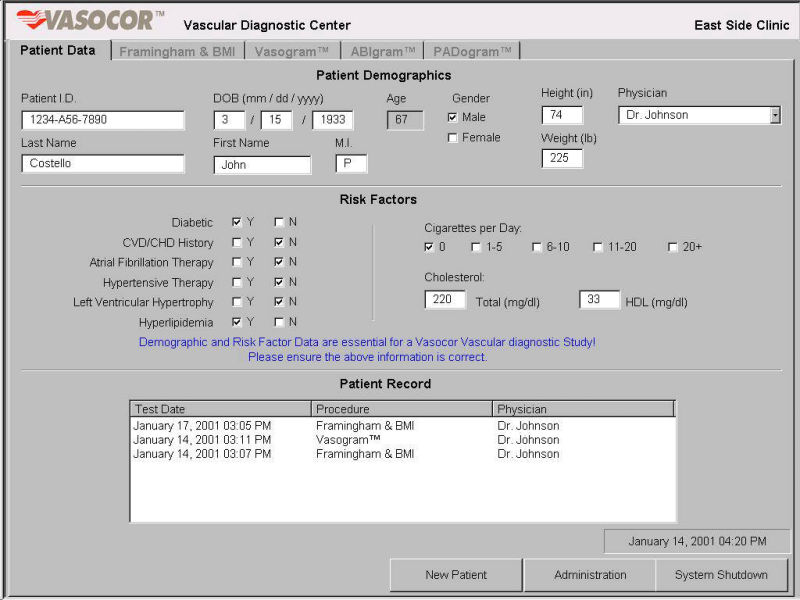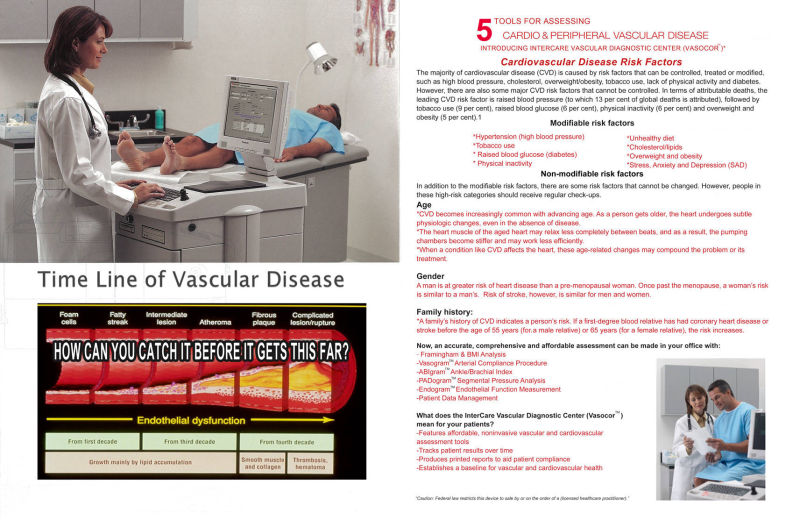VasogramThe Vasogram Module in the InterCare Vascular Diagnostic Center provides a comprehensive system for measuring Atherosclerotic Burden, early detection of Coronary Arterial Disease, potential of Stroke and overall arterial health. An examining table is all that is required for performing this test.
The Vasogram module is a fully automated, computer controlled air plethysmograph designed for clinical use. It allows physicians to measure the compliance of the arteries of the calf and thigh. The test is rapid and painless and can be performed with no risk to the patient in a physician's office. In addition, the cost of the testing is competitive with other noninvasive cardiovascular tests.
Atherosclerosis is a common form of arteriosclerosis in which fatty substances form a deposit of plaque on the inner lining of arterial walls. Arteries are composed of collagen, elastin, and smooth muscle and are under tension/stress in the normal physiologic state.
Atherosclerosis changes the physical properties of the arterial wall, specifically compliance. In order to measure the maximum compliance of an arterial segment and eliminate the effects of absolute pressure within the arterial segment and distal resistance, the normal arterial wall stress must be counter balanced. Changing the cuff pressure in the cuff surrounding the segment of interest can do this.
The Vasogram procedure at the thigh and calf sites, records measurement of local arterial volume change at seven different cuff pressures. The pressures are centered at the mean non-invasive arm cuff measurement taken at the start of the test. The pressures are in increments of 10 mmHg.This allows the plotting of maximum segmental arterial volume change as a function of cuff pressure. This is a well-known curve that exhibits, for normal arterial anatomy and wall morphology or shape, an increasing volume change as cuff pressures are increased to local diastolic pressure. When cuff pressure equals local diastolic pressure, the volume amplitude is normally at its maximum. When cuff pressure is increased over local diastolic pressure, the volume amplitude decreases due to the fact that the artery is now being collapsed over increasing portions of the cardiac cycle. At the end of approximately 10 minutes exam, the Vasogram™ machine produces a written report. The document also lists the patient’s various cardiovascular risk factors, such as smoking, hypertension and obesity, which were previously entered into the system by the operator.
The Vasogram™ test provides the first inexpensive, non-invasive method which has a high correlation for detecting the presence of CAD, particularly in the asymptomatic patient. The diagnostic values of the Vasogram™ test are clear, especially when compared to other commonly used modalities for detecting CAD: coronary angiography, electrocardiogram, thallium stress test, etc. These tests are fast, easy to perform, are noninvasive and produce little or no discomfort to the patient. Because of its low patient risk, low cost and ease of use, a Vasogram™ test could become part of a standard annual or life insurance physical. It would detect CAD in patients who have no current compliant, thus allowing them to be further tested and prescribed appropriate drug, diet and lifestyle changes.
The Vasogram Technology is based on an extensive multi-center, multi-continent and multi-million dollars clinical trial, involving over 1,000 human subjects with different degrees of cardiovascular disease or risk factors and those without any cardiovascular disease or risk factors.
The Vasogram™ test may displace another early stage test, the “stress test”, which is actually more expensive and time consuming to administer. The Vasogram™ test has the potential of becoming a “standard of care" for physicians. The Vasogram™ was validated in a clinical testing program which determined the relationship of measurements made with the Vasogram™ and measures of coronary artery disease by Quantitative Coronary Angiography (QCA) and carotid artery disease by B-Mode Carotid Ultra-sound. A protocol was established and the project was given the name Vasogram™ Improvement Program (“VIP”). Vasocor’s independent Scientific Advisory Board (SAB), which was responsible for the integrity of the medical and scientific aspects of the project, reviewed the data from the clinical trials and the algorithm development.By combining the Vasogram™ score with a cardiovascular risk profile, the two combined evaluations will yield a 90% sensitivity rating while the probability or specificity increases from 58% to 90%. This is accomplished with no invasive procedures and at a nominal cost.
The first clinical trial was suggested by the FDA and involved comparing Arterial Compliance (i.e. Vasogram) measurements with coronary artery disease as determined by invasive coronary angiography. This trial was known as the Vasogram Improvement Program (VIP). The first of phase of this trial began in the first quarter of 1995 and ended during the third quarter of 2000. This trial enrolled 389 subjects, in four major medical centers in the United States and Europe. This trial revealed that the Vasogram measurements correlated well with traditional cardiovascular risk factors and were clinically useful in estimating degree of coronary artery disease as measured by Coronary Angiography
The second clinical study was undertaken to determine repeatability of testing and expected values from a population of subjects over a large age range without cardiovascular disease and was called the Precision Study. This study began in the fourth quarter of 2001 and ended in the second quarter of 2002. Approximately 400 subjects were enrolled from three centers in the United States.This study revealed that the Vasogram methodology for determining Arterial Compliance is repeatable and was characterized over a normal population.
With the knowledge that coronary angiography does not identify early cardiovascular disease, the third and final clinical trial was undertaken to compare Vasogram measurements with degree of aortic atherosclerotic disease as measured by Magnetic Resonance Imaging (MRI). This study included subjects with a wide range of cardiovascular disease and was called the Accuracy Study. This trial began in the late fourth quarter of 2002 and was completed in the third quarter of 2003. Approximately 350 subjects were enrolled from four major medical centers in the United States; three of these centers participated in the Precision Study and two in the early Vasogram Improvement Program. This study revealed that Compliance measurements were more predictive of generalized atherosclerosis than any single traditional risk factor or combination of traditional risk factors for cardiovascular disease. Further this technology has been shown to enhance significantly predictions of risk when all standard factors are considered. MRI of the abdominal aorta was used as the measure of CAD.
For the first time, physicians will know how their patient's arteries compare to healthy subjects of the same gender and age.
The Vasogram technology will be most helpful in identifying subjects at risk in a primary care settings. With this identification treatment will start early and outcomes will improve. Finally, this testing will target subjects who will benefit from more expensive and perhaps invasive testing.
Initial estimates for procedures involving Vasogram technology and total market opportunity, as estimated by McKinsey & Company, is between $300 million and $500 million of a total $1.4 billion market potential.
Potential users of the Vasogram Technology include primary care physicians, cardiologists, vascular specialists, clinics, Research Institutions, Pharmaceutical Companies, and hospitals.
Atherosclerosis is a medical condition in which fatty material is deposited along the walls of arteries. This fatty material thickens, hardens and may eventually block arteries and cause heart disease, stroke or peripheral vascular disease.


